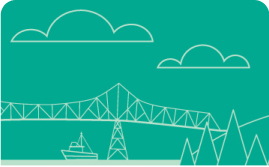Regional Health Assessment: we hear you
Every five years, Columbia Pacific CCO conducts a Regional Health Assessment (RHA), where we collect feedback from the community we serve. We talk to community members in the places where they live, work, and play so we can understand more about their experiences inside and outside the health care system. They share stories about their experiences accessing services, what kind of barriers they have faced, and what kind of factors affect their health. We know everyone's experience is unique and multifaceted, and we take the time to hear their whole story.
The information in these stories becomes the basis for how we prioritize the work we do to meet our members’ needs. It is from these stories that we then develop our Regional Health Improvement Plan (RHIP).
Regional Health Improvement Plan
The RHIP is a trauma-informed, equity-oriented, and person-centered framework that guides our work year to year and day to day, as we deepen partnerships and drive health improvements in the region. The plan gets approved and is overseen by our Community Advisory Councils and Regional Community Advisory Council.
From 2020 to 2024, we invested millions of dollars, devoted countless hours of work, strengthened existing partnerships and formed new ones to advance the priority areas of our Regional Health Improvement Plan for the five-year period. We’re proud of the progress we made on priorities ranging from affordable housing to trauma informed care.
“We know that our voices are heard and our experiences are valued.”
- Community Advisory Council member
We wouldn't be able to do this work without community input. Community voices are critical to everything we do. Our 2025-29 Regional Health Improvement Plan is available to view here:
Regional Health Improvement Plan Progress Reports
Columbia Pacific uses the RHIP as the guiding force in deepening partnerships with community groups to drive health improvements in its service region. This page is updated periodically with progress reports towards the goals of each of the key priority areas.
Progress reports and updates from the 2020-2024 Regional Health Improvement Plan.
- 2019 RHIP for all counties (PDF)
- 2021 progress report (PDF)
- 2022 progress report (PDF)
- 2022 annual update presentation (PDF)
- Clatsop County strategic plan (PDF)
- Columbia County strategic plan (PDF)
- Tillamook County strategic plan (PDF)
- Priority Area Update: Traditional Health Workers
- Priority Area Update: Social Safety Net
- Priority Area Update: Harm Reduction Resources
- Priority Area Update: Trauma Informed Networks
- Priority Area Update: Suicide Prevention

